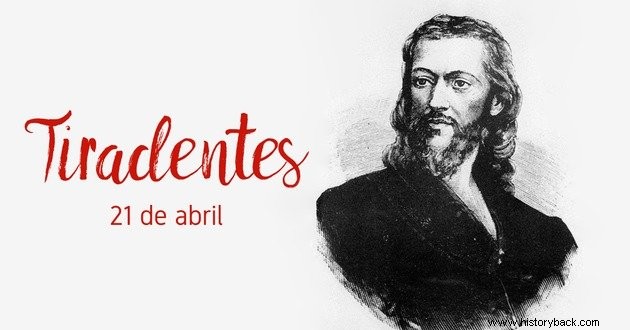The Day of Tiradentes is celebrated April 21 in Brazil since 1965, by Law No. 4,897.
This date is national holiday and pays tribute to Tiradentes, considered a national hero, martyr and Patron of the Brazilian Nation.
In order to emphasize the importance of this multifaceted figure in the development of Brazilian history, the date refers to the day of his death, when Tiradentes was hanged and quartered on April 21, 1792 .
According to him:

Who was Tiradentes?
Joaquim José da Silva Xavier was born on November 12, 1746 in Minas Gerais, in the city of Pombal (today called Tiradentes).
The nickname “Tiradentes” was related to the pharmaceutical practice that at the time authorized them to perform dental operations.
Tiradentes became involved in one of the 18th century libertarian revolutionary movements that took place in the colony at that time. It must be remembered that there were other rebellions such as the Vila Rica Revolt or the Baiana Conjuration.
The arrest and death of Tiradentes
In 1788, Tiradentes became involved in the revolutionary movement of the Inconfidência Mineira against the Portuguese Crown. He was arrested on May 10, 1789, in Rio de Janeiro, while trying to rally support for his cause.
He was imprisoned for three years and was the only one of the group of Inconfidentes to be sentenced to hang. He was hanged and then quartered, in Praça da Lampadosa, in Rio de Janeiro, on April 21, 1792.
See also:TiradentesMin Confidence
The Inconfidência Mineira was a separatist and libertarian movement, also called "Conjuração Mineira", and sought the emancipation of the captaincy of Minas Gerais in relation to Portugal.
During the 18th century, the Portuguese turned their attention to the region of Minas Gerais, as several gold and diamond mines were found there. This is where the name of the state comes from.
Minas Gerais became the great attraction for explorers and conquerors who settled there to try their luck.
Therefore, the extraction of gold became the main economic activity of the Portuguese Crown during the 17th and 18th centuries. In addition to exploiting the mines, workers and slaves, high taxes were collected from the colony such as the fifth, pours and capitation.
Much of the gold mined was sent to Europe for the purpose of enriching the Crown. The abusive taxes left the elite and the population increasingly unhappy with this situation.
Learn more about the Inconfidência Mineira.
The group of Inconfidentes
The Inconfidentes, influenced by the Enlightenment ideals, were a group made up of representatives of the Minas Gerais elite. There were landowners, military, miners, lawyers, intellectuals and priests.
It was composed of about 30 members, including the Portuguese-Brazilian poet Tomás Antônio Gonzaga (1744-1810) and the Minas Gerais poet Cláudio Manuel da Costa (1728-1789).
The group fought, above all, for the autonomy of the captaincies, the independence of the region and the implementation of a republican government system.
When reported to the Portuguese Crown, the movement was undone, resulting in the hanging of Tiradentes and the imprisonment or exile of the other inconfidentes.
Also Read:April Commemorative Dates
